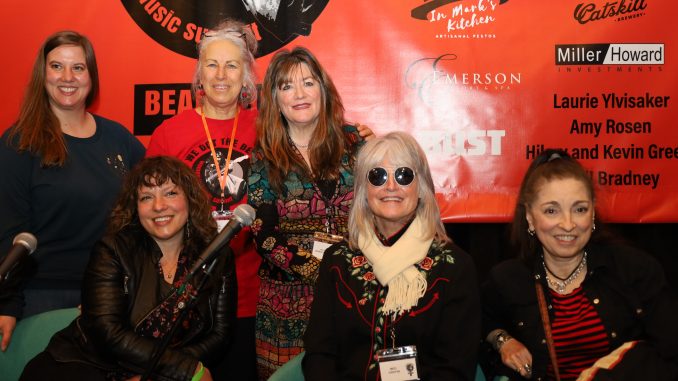
You may not know her face, but her voice is as comforting and recognizable as your childhood teddybear. Maybe it was over long car rides, or maybe it was in the background of your kitchen as your father cooked Sunday dinner, but Meg Griffin’s voice has been preserving the soundtracks to our parent’s youth over the SiriusXM airwaves long before some of us were even conceived.
She has always been just beyond your eye-line, in the background of the music scene curating and hand-picking who is talented and unique enough to have the privilege of being on the foreground. Names you’ve probably heard of — Patti Smith, the Sex Pistols and the New York Dolls, just to name a few — owe their successful careers to Griffin’s fine-tuned ear.
When all of her fellow colleagues were still splashing around in the shallow end of old-school rock and roll, she was hanging out in the deep end, waiting for the next big wave of music to take the world by storm. In the early 70’s, she had finally caught the surf; punk music had entered the streets of New York City from the sewers, and Griffin was the first radio DJ to bring its melodic anger to the eardrums of America.
“There were never as many women at the stations that I worked at as men, women were usually the token, the fill in weekends,” says Griffin. “But I got in the door quickly as a part-timer, and in no time I was full time, and in no time I was the music director. They could tell I really knew the music. I never approached it as gender. And truth be told, I always knew more about music than them, and they knew it. They were cool with it and they loved it. We were just a tribe of music nuts, it was boundary free.”
In order to be a trailblazer, you cannot be afraid to get burned by the flames. Whether it’s facing criticism from listeners, being fired or having to rebuild from the ground up, sticking to your gut and standing up for your work is going to be occasionally painful. At many points during her career, “Megless’’ — as many of her original listeners may know her by — has had to make arduous decisions in order pursue her passions, including the infamous incident where she turned down a job offer from MTV.
“I could feel that it was going to be controlling. I came in, and they thought I was going to sign but I knew I wasn’t, and I hear Bob Pittman, the guy who is running the whole thing say on the phone that he already has his Black, his Jew, his sex-bomb, and that today he’s getting his tomboy,” says Griffin, laughing at the memory’s ridiculousness. “I’ve always related to that, being a tomboy. But still, I go into his office and he tells me that I can’t be on the radio if I work for them, because they don’t want their employees to have another job to fall back on. Everything in my gut about this was telling me to run. I managed to get out of there without signing and I never regretted my decision.”
Even in times when the radio was her worst enemy, when it demanded that she play music for a more easy-going crowd instead of her beloved anarchists, she still found a way to feed her insatiable rebelliousness. “My ex-husband and I ran a punk station in New York for about a year, and management decided that we were too rebellious and changed the format to love songs,” says Griffin. “The entire staff was essentially out of a job, so I invited them over to the house, and almost jokingly said that we should form a band; for some reason they agreed with me. I had no business being there, everyone else in the band was a talented musician, but somehow we opened for a lot of really great people like Levon Helm, Donovan and Lucinda Williams.”
This past weekend, in harmony with Women’s History Month, Griffin made an appearance at the Women in Music Summit in Woodstock to speak on a panel for successful women in the business, fitting for such a groundbreaking career like hers. As a closing statement, Griffin said, “It can be lonely, not everyone is gonna jump on with you if you’re doing something a little bit risky whatever that might be, and you may have your own doubts if people are naysaying, but my mantra has always been stay your course. In 47 years, I’ve gone way up and way down and all over the place, but when it gets really tough going, don’t give up.”
